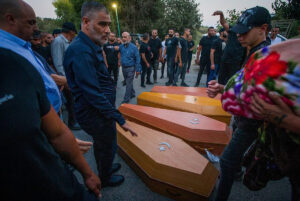Abandoned by the state, Palestinian citizens of Israel face record crime wave

At the funeral of five Palestinians who were shot to death in the Bedouin town of Basmat Tab’un, 29 September 2023
Baker Zoubi writes in +972 on 30 May 2024:
“If I can stay with my family abroad, I’ll be able to raise my children normally. But if I have to return to Israel, I’ll turn my children into criminals.” A. is a Palestinian citizen of Israel, who has been pursued by a criminal organization and is now trying to leave the country with his family. “In our reality today, you have to be a criminal in order to survive, and it’s clear that the situation will get worse in the coming years.”
Some may say this is an exaggeration, and insist that Palestinian citizens of Israel lead normal lives, better than most Palestinians and Arabs. But in addition to widespread discrimination against and increasing political persecution of Palestinian citizens by the Israeli government, the number of Palestinian victims of organized crime continues to rise at a frightening rate.
According to a Taub Institute study, the Arab community in Israel had the third-highest murder rate among OECD countries in 2019 — just below Mexico and Colombia — with 11.11 murders per 100,000 citizens, a figure that tripled for those between the ages of 20 and 34. The study also noted that murders in Palestinian communities more than doubled, from 109 cases in 2022 to 233 in 2023, with a consistent climb in the murder rate every month through last September.
“There are few villages that have not experienced shootings, or where there are no threatened families, demands for protection money, car bombings, and so on,” said Rawyah Handaqlu, an attorney who heads the Emergency Headquarters to Combat Crime in Arab Society — an emergency body established last September by the High Follow-Up Committee and the National Committee of the Heads of Arab Local Authorities.
“It’s not just about the number of fatalities,” she explained. “Entire families have left the country or changed their place of residence, others are hiding in their homes, not to mention the daily explosions, the burning of cars, and all those injured in the attacks, which sometimes are not even reported in the media.”
Rawyah Handaqlu, an attorney who heads the Emergency Headquarters to Combat Crime in Arab Society. (Lime Production)
Since the beginning of this year, 86 Arab citizens have been murdered — a startlingly high number that suggests the murder rate this year will be similar to last year’s. Yet although the numbers are roughly the same, criminal organizations have recently escalated their tactics, publishing lists of murder targets, abducting civilians, and hiding the bodies of their victims.
“Today, for example, we no longer hear about a stabbing: there are now anti-tank missiles, mortar shells, and drones. In the absence of the law, things are developing horribly,” Handaqlu warns.
“The heads of the criminal organizations know exactly how the police work, and they plan their work accordingly, so you feel that things are coordinated,” A. said. “In the absence of any real deterrent, the pace of their activity only increases.” He notes that in past years, gunmen would burn their getaway vehicle in a remote area in order to hide and destroy any evidence. But now, they will blow it up near the crime scene — and if they previously limited their attacks to certain targets, now they will go after the target’s family as well.
“I’m not surprised that there are some who have killed 10 or 20 people in recent years,” A. told +972. “No one prosecutes them, most murder cases are closed or dragged out, and all the evidence from security cameras, witnesses, fingerprints, and traces is ‘wasted’.” He has no hope that the situation will improve; in the coming years, A. warns, “only your fists will protect you.”
